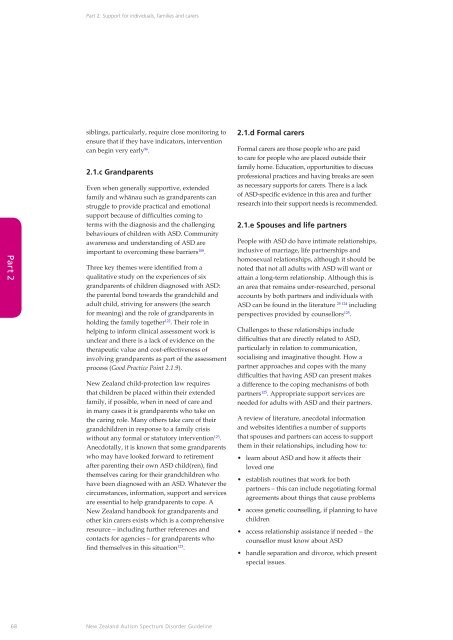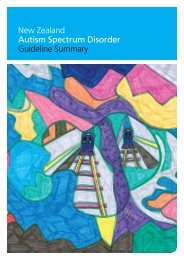New Zealand Autism Spectrum Disorder Guideline - Ministry of Health
New Zealand Autism Spectrum Disorder Guideline - Ministry of Health
New Zealand Autism Spectrum Disorder Guideline - Ministry of Health
You also want an ePaper? Increase the reach of your titles
YUMPU automatically turns print PDFs into web optimized ePapers that Google loves.
Part 2: Support for individuals, families and carers<br />
Part 2<br />
siblings, particularly, require close monitoring to<br />
ensure that if they have indicators, intervention<br />
can begin very early 96 .<br />
2.1.c Grandparents<br />
Even when generally supportive, extended<br />
family and whänau such as grandparents can<br />
struggle to provide practical and emotional<br />
support because <strong>of</strong> difficulties coming to<br />
terms with the diagnosis and the challenging<br />
behaviours <strong>of</strong> children with ASD. Community<br />
awareness and understanding <strong>of</strong> ASD are<br />
important to overcoming these barriers 108 .<br />
Three key themes were identified from a<br />
qualitative study on the experiences <strong>of</strong> six<br />
grandparents <strong>of</strong> children diagnosed with ASD:<br />
the parental bond towards the grandchild and<br />
adult child, striving for answers (the search<br />
for meaning) and the role <strong>of</strong> grandparents in<br />
holding the family together 122 . Their role in<br />
helping to inform clinical assessment work is<br />
unclear and there is a lack <strong>of</strong> evidence on the<br />
therapeutic value and cost-effectiveness <strong>of</strong><br />
involving grandparents as part <strong>of</strong> the assessment<br />
process (Good Practice Point 2.1.9).<br />
<strong>New</strong> <strong>Zealand</strong> child-protection law requires<br />
that children be placed within their extended<br />
family, if possible, when in need <strong>of</strong> care and<br />
in many cases it is grandparents who take on<br />
the caring role. Many others take care <strong>of</strong> their<br />
grandchildren in response to a family crisis<br />
without any formal or statutory intervention 123 .<br />
Anecdotally, it is known that some grandparents<br />
who may have looked forward to retirement<br />
after parenting their own ASD child(ren), find<br />
themselves caring for their grandchildren who<br />
have been diagnosed with an ASD. Whatever the<br />
circumstances, information, support and services<br />
are essential to help grandparents to cope. A<br />
<strong>New</strong> <strong>Zealand</strong> handbook for grandparents and<br />
other kin carers exists which is a comprehensive<br />
resource – including further references and<br />
contacts for agencies – for grandparents who<br />
find themselves in this situation 123 .<br />
2.1.d Formal carers<br />
Formal carers are those people who are paid<br />
to care for people who are placed outside their<br />
family home. Education, opportunities to discuss<br />
pr<strong>of</strong>essional practices and having breaks are seen<br />
as necessary supports for carers. There is a lack<br />
<strong>of</strong> ASD-specific evidence in this area and further<br />
research into their support needs is recommended.<br />
2.1.e Spouses and life partners<br />
People with ASD do have intimate relationships,<br />
inclusive <strong>of</strong> marriage, life partnerships and<br />
homosexual relationships, although it should be<br />
noted that not all adults with ASD will want or<br />
attain a long-term relationship. Although this is<br />
an area that remains under-researched, personal<br />
accounts by both partners and individuals with<br />
ASD can be found in the literature 25 124 including<br />
perspectives provided by counsellors 125 .<br />
Challenges to these relationships include<br />
difficulties that are directly related to ASD,<br />
particularly in relation to communication,<br />
socialising and imaginative thought. How a<br />
partner approaches and copes with the many<br />
difficulties that having ASD can present makes<br />
a difference to the coping mechanisms <strong>of</strong> both<br />
partners 125 . Appropriate support services are<br />
needed for adults with ASD and their partners.<br />
A review <strong>of</strong> literature, anecdotal information<br />
and websites identifies a number <strong>of</strong> supports<br />
that spouses and partners can access to support<br />
them in their relationships, including how to:<br />
• learn about ASD and how it affects their<br />
loved one<br />
• establish routines that work for both<br />
partners – this can include negotiating formal<br />
agreements about things that cause problems<br />
• access genetic counselling, if planning to have<br />
children<br />
• access relationship assistance if needed – the<br />
counsellor must know about ASD<br />
• handle separation and divorce, which present<br />
special issues.<br />
68<br />
<strong>New</strong> <strong>Zealand</strong> <strong>Autism</strong> <strong>Spectrum</strong> <strong>Disorder</strong> <strong>Guideline</strong>











